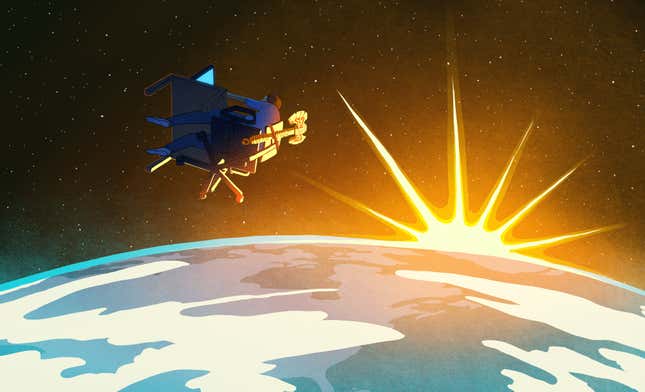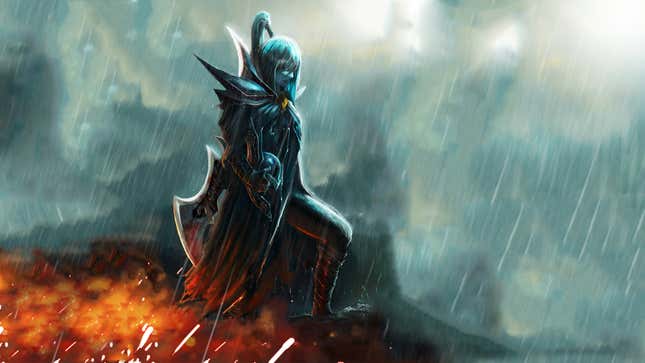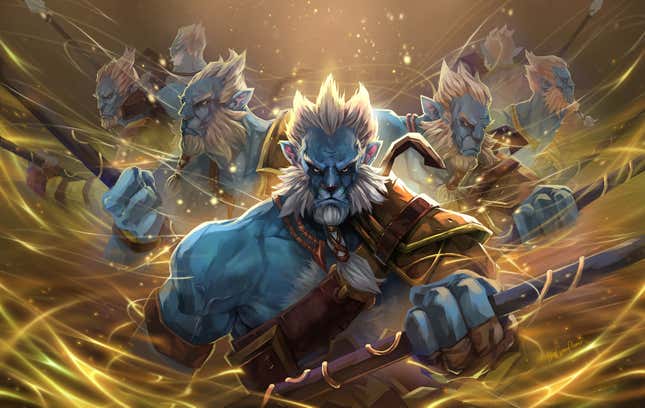
I started playing Dota 2 when I was in college, something I wanted to do to distract me from what I thought I was supposed to do. (Everyone gets a Bachelor’s degree today, right?)
In high school, I liked fooling around with free music composition software, building quartets and ensembles I’d print and pass out to others. I brought up the idea of being a composer to my parents. They weren’t so keen. So it was mass communications, because I was on the newspaper in high school, because a cute girl told me I wrote well.
By sophomore year, having drifted far from most of my friends after leaving for college, I found refuge from my aimlessness in games—multiplayer games, specifically. First it was StarCraft II, then League of Legends, and finally, Dota 2.
I came to Dota 2 through another game, League of Legends, thanks to a group of friends that jumped ship once the beta for the former started. A five-on-five game that’s one-part strategy, two-parts hero brawler, Dota 2 is endlessly intricate and infinitely consuming. It’s filled with systems and mechanics that all intersect in weird ways, a mish-mash of genres and design concepts that reflect its inception as a mod for WarCraft III.
Getting lost in these games gave me a sense of purpose and belonging beyond the score-based euphoria of other games. Each game I carried as Bloodseeker, I was a critical member of a team, a necessary component. Knowing exactly where you stand, even in a game, felt better than wondering what makes you stand out in a sea of people all flowing through the same motions.
This week, I passed a major life milestone. It wasn’t a graduation or marriage or the birth of my first child—I have now, according to Steam, played over 3,000 hours of Dota 2. It’s an odd feeling to see so many hours of my life accounted for, condensed into one solitary number. It’s like knowing exactly how many hours you’ve spent mindlessly flicking through Twitter, sitting on the toilet, or lying in that vast purgatory between when you wake up in the morning and when you finally get out of bed. It’s personally fascinating, but it’s hard to know, at first, what to do with that kind of information. By my own approximation, 3,000 hours over six years amounts to me playing Dota 2 one hour every 17 hours, a nearly uninterrupted stream I’ve followed since I started playing.
A healthy chunk of those 3,000 hours comes from my aimless summer between sophomore and junior year of college, the first in a long time I wasn’t working at my usual spot or preoccupied with summer activities. I was in a house in my hometown where I barely knew anyone anymore. So I played Dota 2, from noon to 4 a.m. or later, every day, for three months straight.
In one game that summer, I was playing Phantom Assassin. I was terrible at last-hitting—in games like Dota, you have to land the killing blow on something to get its gold reward, and gold buys you important items needed to keep ramping up over your enemy. I still wasn’t used to the swing time in Dota, where everything felt slower compared to League. My support was a random player I had matched up with, and he berated me every time I missed a last hit.
“Buy a quelling blade,” he said. “Don’t just attack, time your swings. Use ‘S.’ Stop missing!” I learned to last hit that day. I still think about it every time I play PA.

After a while, that summer became a blur. I spent sunny days inside reading over Dota meta discussions, nights arguing with online friends about team compositions and hero rankings. It was comforting, for a while, but Dota has a way of shifting. Patches in Dota 2 are like Christmas, gifting you with dozens of granular changes that offer nerds like me the chance to pore over every inch and learn. I could never hope to master the game, but every day, I felt closer. By the end of that summer, Dota was a daily ritual for me, somewhere between obligation and occupation.
But you lose enough matches, and that uninstall button starts to look more appealing every time you boot up Steam. I’m not sure which match it was—maybe the Rubick game where I fed so much, I was still level five at 20 minutes in, or maybe it was one of the dozens of times I got in a literal shouting match—but it was getting harder to tell if my frustrations were with Dota or with myself. “You don’t value our support,” I’d proclaim. We’d lose a game and the support player, usually me, would instantly be blamed. “You can’t rely on us to win your lane for you.”
One night, drinking and playing Dota 2, I decided to play Pudge, the hook-monster himself. You would think that a hero designed around accuracy and timing would be difficult to play, and frankly, my memory of that game is fuzzy. As I was informed later, by the replay and my friends, I had somehow reached Pudge nirvana, and become someone unlike myself at the time. I was roaming and fearsome, landing incredible hooks and predicting enemy movement like I was clairvoyant. At the time, it felt like just another Tuesday night.
By the time I walked back onto campus for my junior year, I knew I couldn’t keep waiting to fall ass-backwards into something that felt right. On the first day of a sports writing class I was taking purely because my friends were taking it, a student stood up to make an announcement: He was starting a student-run sports show and he needed volunteers, regardless of experience or skill. I raised my hand. Sometimes, if you’re lucky, that’s all it takes.
For the next two years I replaced endlessly cramming Dota 2 with spending my nights working into mornings, learning all I could: camera work, motion graphics, non-linear video editing. We kickstarted a video game review show. I got a part-time job as a camera guy for the athletics department. I was on ESPN. Our sports show moved from the library to the computer labs, to its own office, from YouTube to Fox Sports Southwest.
After graduating, it wasn’t long before I felt adrift again, back to that summer feeling, back to eyeing that “Play” button. A place that was the same as I left it, and wouldn’t be changing any time soon.
Rarely have I ever been as passionate and angry as I’ve been in a game of Dota 2. Sometimes, you start a game and look at your allies’ starting items and already know: You’re going to spend the next hour of your life fuming like a cartoon.
Even a single game of Dota 2 is an investment. There’s no surrender option—once you’re in a match, you’re seeing it through to the end. And when that solo off-lane Necrophos is walking up to a safe tri-lane with just a Ring of Regen and a Headdress recipe, you’re going to lose your shit. People will disappoint you, including yourself. That Bounty Hunter that ganked your lane constantly and killed the enemy courier? Well, he’s rushing a bad item instead of Guardian Greaves, and he maxed Jinada. Also, he doesn’t use Track because, as he says, “it breaks my stealth, dude. They’ll know I’m here.”
Deep breaths. Inhale, count to four, exhale, count to four.
After a long summer of job applications, all met with silence, I started freelancing for a games site. Reviewing games was fun in college, more an excuse to play video games than anything else, but I enjoyed it.
But soon enough, I was traveling—on my own dime, mind you. But still, I was networking. An internship with Paste Magazine led to freelance work. A haphazard Twitter DM got me a gig writing about Dota 2, and the game I had always thought of as an escape became the place where I was supposed to be.
I enjoy the mechanical, physical act of playing Dota 2. I love the design idiosyncrasies of Dota 2. I adore the competitions, the spectacle, the feeling when I saw the million-dollar Dream Coil and leapt out of my seat. I vividly remember when my group figured out that you could buy Radiance and Aghs on Lifestealer, then swallow a Pudge with its Rot on, then jump inside an ancient, creating a Russian nesting doll of destruction. All the five-man Black Holes and Ravages I’ve landed. For every missed Hookshot as Clockwerk, I can remember another where I’ve annihilated someone with the same ability. The from-downtown threes I’ve landed as Ancient Apparition, or the pinpoint-accurate Sunstrikes.
My end goal in all that time playing Dota 2 was never really to become a professional, or even a top-level player (I’m too old now anyway). It was to find a place, a community, a fit. The game, and all the incredible people I’ve met because of it, have found ways to spur me forward, intentionally or inadvertently.
At our flagship Compete event in New York a couple of months ago, I invited a guy whose actual name I didn’t know to come hang out and play Street Fighter with us. I only knew him by “EastWall,” his screenname. He’s an adjunct professor at Rutgers University, but most nights of the week, he’s the guy telling me I suck at Dota 2. Most of the people I play with now, I met through Dota or League, just matching up games in looking-for-group channels. Americans, Canadians, even one New Zealander. One summer, when the Winnie the Pooh Home-Run Derby game was still a meme, we all changed our in-game names to match characters from it. Over 3,000 hours, that group has become another constant in my life outside the game itself.

When I look at my match history, all 3,000 hours, I see it: the chart of my growth as a player and person. I can pinpoint different curves in the road. Here I played Phantom Lancer, because I was feeling good and wanted to win a game with my favorite hero. There’s a series of losses on supports, from a time I was struggling. There’s no games here for a week—I was busy working. Two years later, here’s a long stretch of games on popular heroes, a study binge before a new article went up about trends in the meta-game.
Across 3,000 hours, I’m no less anxious or weary, but I’ve found a place in the world, started to stake a claim rather than aimlessly drift through, mindlessly queueing up for games and hoping for the best. I don’t play as often as I used to, but I keep coming back. Dota isn’t done with me yet.